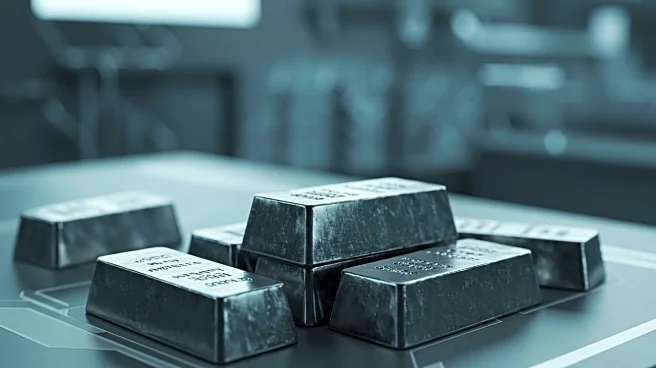What's Happening?
Military Metals is actively advancing its antimony projects in North America and Europe, focusing on the strategic importance of antimony in defense and industrial applications. The company, led by CEO Scott Eldridge, is gearing up for a field campaign at the Tiennesgrund Antimony-Gold Project in Slovakia, set to begin in October 2025. This initiative aims to map structural controls to refine drill targets, leveraging historical data to support secure supply chains for industries like defense and renewables. Antimony is crucial for hardening lead in munitions and armor-piercing rounds, and the project aligns with the European Union's Critical Raw Materials Act. Eldridge emphasizes the urgency of reducing import dependence, particularly given China's dominance in antimony mining and processing, which poses risks to Western nations amid geopolitical tensions.
Why It's Important?
The advancement of antimony projects by Military Metals is significant for U.S. national security and industrial strength. Antimony is a critical component in military applications, and the current low levels of U.S. stockpiles heighten risks for defense capabilities. By establishing secure, domestic supplies, Military Metals aims to reduce reliance on imports, particularly from China, which controls a significant portion of the global antimony market. This move supports the resurgence of American industrial strength and aligns with NATO's increased defense spending. The initiative also contributes to addressing Europe's antimony shortfall, reinforcing regional resilience and strategic stockpiling efforts.
What's Next?
Military Metals plans to commence its field program in October 2025, focusing on refining drill targets at the Tiennesgrund project. The company is committed to collaborating with North American and European partners to achieve supply independence within the next three to five years. This collaboration is vital for long-term solutions to secure antimony supplies, essential for defense and industrial applications. The ongoing geopolitical tensions and export controls further underscore the importance of these efforts.
Beyond the Headlines
The strategic focus on antimony highlights broader implications for global supply chain security and industrial resilience. As geopolitical tensions rise, the need for secure and independent supply chains becomes increasingly critical. Military Metals' efforts contribute to a shift towards regional self-sufficiency, potentially influencing policy decisions and industrial strategies in both the U.S. and Europe.









